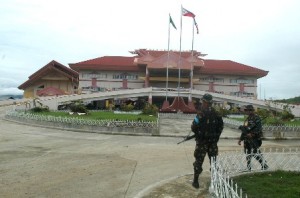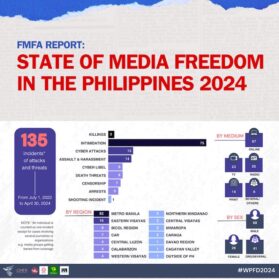BULUAN, Maguindanao (MindaNews/19 October) — Governor Esmael Mangudadatu may refer to his office as “Satellite Office” but several Maguindanao residents believe the governor has transferred the Capitol to his hometown here, prompting suggestions, though jokingly, for the provincial capitol to be set up on a bus instead, like a mobile hospital, so it can be moved where the new governor wants it.
Today, Maguindanao is the only province in the country where its elected governor and vice governor hold offices “temporarily” in municipal buildings located 120 to 140 kilometers away (depending on where one passes), and this is not because there is no provincial capitol.

In fact, the province has two, both abandoned: the old provincial capitol along the Davao-Cotabato highway in Nuling, Sultan Kudarat which Datu Andal Ampatuan Sr. deserted in 2001, a few months after he became governor, following an alleged ambush attempt in what was purportedly a Candao-controlled area (Zacaria Candao, the governor he defeated); and the new P218-M provincial capitol in Shariff Aguak (P50-M of that from President Arroyo’s Social Fund), the only capitol in the country with a jacuzzi whirlpool bath in the governor’s wing, and which Mangudadatu and Mastura abandoned for Buluan and Sultan Kudarat town, respectively.
“Hindi ako pwede mag opisina doon. Hindi sa takot ako. Ayoko nang gulo. Kasi magkakagulo kami kung magho-hold ako ng office doon. Pangalawa, baka bombahin nang bombahin ang mga opisina doon. Wala tayong hinahanap kundi away,” (I can’t hold office there. It’s not that I’m afraid. I don’t want trouble. There will be trouble if we hold office there. Second, the offices there might just be bombed. We’ll end up with more trouble),” Mangudadatu said of the captiol in Shariff Aguak, the Ampatuans’ bailiwick.
“For security reason,” Mangudadatu prefers to stay in his “Satellite Office” in his hometown in Buluan.
The Sangguniang Panlalawigan in fact passed Resolution 005 “recognizing the satellite office” of the governor “for security reasons due to the prevailing armed sightings and other related threats” as a result of the Nov. 23, 2009 massacre.
Earlier, both Mangudadatu and Vice Governor Ismael Mastura spoke about rehabilitating the old provincial capitol in Nuling, Sultan Kudrat, but no repair work has started. In fact, no budget has been allocated for its rehabilitation.
 He said they will likely begin repairs in the old capitol in January 2011 and estimates the cost at around P50 million.
He said they will likely begin repairs in the old capitol in January 2011 and estimates the cost at around P50 million.
“Hopefully next year,” Mangudadatu said.
The Mangudadatu administration ends noon of June 30, 2013.
Meanwhile, employees based in Cotabato City – and most of the employees are based there -have to spend much to get to Buluan. The province-owned bus goes to Buluan from Cotabato on Mondays and leaves Buluan for Cotabato Fridays.
Some employees have had to find boarding houses in Buluan.
Employees also had to ride the bus to get to the Shariff Aguak capitol under Ampatuan. But Shariff Aguak is only 54 kilometers away from Cotabato City. Cotabato City to Buluan is more than twice the distance between the city and Shariff Aguak.
Problems brought about by the location changes of the capitol, however, are but a few of the problems confronting the Mangudadatu-Mastura team.
Setting up governance structures in an area where clan politics hold sway, is among the problems of any post-Ampatuan administration but Mangudadatu, as early as the day after his proclamation as Governor-Elect, said, in Pilipino: “You know, it’s so easy. First, government funds are not for me but for the community. My program is to have more scholarships for deserving students. We can even overhaul this that way…Within the first 100 days, we should be able to buy a mobile hospital so that the people will not look for the hospital but the hospital will look for the people. The people here, they cannot even buy Cortal, Medicol.”
Until the November 23, 2009 massacre which signaled the end of the reign of the Ampatuans in Maguindanao, the country’s third poorest province, actually had at least P80 million every month as internal revenue allotment. But there was hardly a semblance of governance and delivery of basic services in the area whose leaders were known to be allies of then President Gloria Macapagal-Arroyo.
Accountability for the expenditure of public funds had always been a problem in the province, even before the entry of the Ampatuans.
After the massacre, however, a special audit of Maguindanao’s funds was ordered and while it was completed by the team from the Commission on Audit sometime in January 2010, no report of the special audit has been made public.
Even Mangudadatu has yet to see a copy of the report.
Today, Maguindanao receives at least P90 million a month in IRA. But the governor says they have loans to pay, left behind by the Ampatuan administration. Asked how much debt the Ampatuans left behind, Mangudadatu said in August, “in hundreds of millions.”
But he couldn’t say how much of the P90 million monthly goes to payment of the Ampatuan debts. He told MindaNews Friday that he’ll check on the exact figures.
He said the loan was incurred by the Ampatuans for “heavy equipment or road project. I will have it checked.”
Accountability for public funds is among the many issues the Mangudadatu-Mastura team has to address in the post-Ampatuan era, given that all eyes are on Maguindanao.
The constituents’ view of the provincial government as an employment agency and how the province responds to this is yet another.
One early Friday afternoon in August, Ramadan fasting notwithstanding, hundreds of Maguindanaoans gathered in whatever available space there was in the “Satellite Office” here – outside, at the lobby and inside the office of the governor — most of them carrying folders.
They were job-seekers who knew they would likely land in jobs that will be theirs only for a month or so. But they queued, nonetheless, for the Governor’s signature.
This is supposed to be a daily routine, especially if the governor is in town.
 Mangudadatu said he passes the files on to the Personnel Selection Board. “For example, if I see that she/he is a graduate of nursing and he/she can be assigned to the district or mobile hospital, I put a marginal note “October for October Job order so that when October comes, I will remove some, and they will take over.”
Mangudadatu said he passes the files on to the Personnel Selection Board. “For example, if I see that she/he is a graduate of nursing and he/she can be assigned to the district or mobile hospital, I put a marginal note “October for October Job order so that when October comes, I will remove some, and they will take over.”
“You give people the chance to work,” he said.
Mangudadatu and his vice governor vowed during their campaign to focus on health, education and livelihood. [Tomorrow: Starting from zero]
Previous: From Ampatuan to Mangudadatu (1): Changing the image of Maguindanao
(Carolyn O. Arguillas/MindaNews for the Philippine Public Transparency Reporting Project. MindaNews is one of four partners that together comprise the PPTRP. This series is a joint PPTRP/MindaNews initiative)
